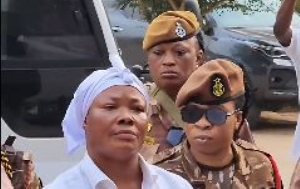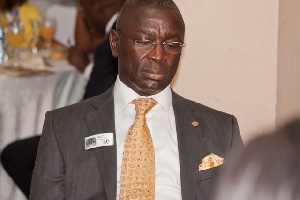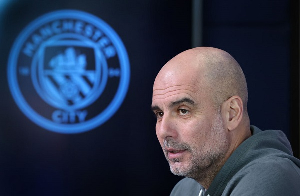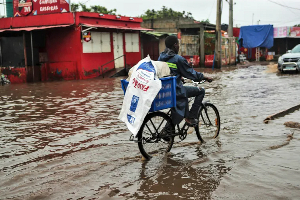Outgoing UT Bank CEO Prince Kofi Amoabeng has said the Government must do two major things to improve the health of the economy.
Mr Amoabeng to Paa Kwesi Asare on Starr FM’s Business Edition on Tuesday that the Government must cut down on borrowing, “so that the debt stock will come down to far below 70%,” and also ensure fiscal discipline to stabilise the Cedi against the Dollar.
"I think we are in difficult times,” he said in response to a question that solicited his views about the 2016 budget presented to Parliament on Friday by Finance Minister Seth Terkper.
Mr Terkper told Parliament on Friday that Ghana’s public debt stock was now "increasing at a slower pace."
The slow-down, he said, can be put down to prudent fiscal measures being implemented by the Government.
Currently, Ghana’s total debt stock, according to Mr Terkper is GHC92.2 billion.
It increased by GHC5 billion between May and June 2015. As of September this year, figures from the Bank of Ghana’s economic and financial data showed the total debt stock stood at GHc94.5 billion, representing 70.9% of Gross Domestic Product (GDP).
After its first review of Ghana’s implementation of a three-year bailout programme, the International Monetary Fund (IMF) said the country’s performance under the Extended Credit Facility programme exceeded pre-HIPC levels.
Per the trend of the growing debt stock, the Bretton Wood institution, projected that Ghana will end 2015 with a 75% debt-to-GDP ratio.
Ghana’s total public debt in the first-half of the year has increased consistently by about GHc15.1 billion, growing from GHc79.4 billion in January, to GHc94.5 billion in June.
Meanwhile, International Ratings agency, Fitch on Tuesday November 17 identified some challenges that will militate against Ghana’s fiscal consolidation as far as the country’s 2016 budget read on Friday is concerned.
"Ghana's 2016 budget and fiscal data for 9M15 show continued commitment to fiscal consolidation,” Fitch Ratings said, adding: “But greater reliance on revenue than expenditure measures may make consolidation more challenging next year if growth disappoints or oil production at the TEN field is delayed, and elections make spending control harder."
The budget presented to Parliament aims to narrow the deficit to 5.3% of GDP (cash basis) in 2016, in line with the IMF programme.
The government expects revenue to rise by 1.4% of GDP from 22.6% in 2015 (excluding the impact of import exemptions, which are now included as a memo item).
A simplified income tax regime is forecast to boost revenue by 0.3% of GDP due to improved compliance. The start of production at the TEN field is set to increase oil revenue.
The government expects expenditure, stripping out the cost of import exemptions, to fall by 0.4% of GDP as wage cuts, lower interest payments, and reduced capex offset election-related spending included in goods and services, and additional spending on transfers and subsidies.
Fitch, however, said it "thinks the deficit will narrow more slowly, to 6.2% in 2016, due to our lower revenue assumptions and the challenges of consolidating expenditure ahead of elections.”
It warned: "Financing the deficit is likely to be challenging and expensive. The authorities assume an additional USD750m Eurobond in 2016. Ghana paid 10.75% to issue a 15-year USD1bn Eurobond in October, despite the World Bank's partial guarantee."
It said planned domestic issuance at 3.4% of GDP, unchanged from 2015, suggests borrowing costs will remain high (short-dated treasury bills currently yield around 25%). The IMF programme prohibits recourse to central bank financing from 2016.
Consolidation is on track in 2015, Fitch noted, adding that data for 9M15 shows a deficit of 5.1% of GDP, below the target of 5.7%. This was partly due to underpayment of social contributions and grants to government units, which helped offset higher capital spending.
Domestic borrowing – including central bank financing – was higher than expected, but within the limit set by the IMF. “We forecast the 2015 deficit to narrow to 7.8% of GDP from 10.2% last year, slightly higher than the authorities' figure of 7.3%,” Fitch projected.
"But government debt has risen above 70% of GDP, from 39.1% in 2011. Ghana's debt structure has also deteriorated, reflecting increased non-concessional external financing and short-dated domestic securities.
"High domestic yields and a sharply weaker exchange rate have pushed up borrowing costs, with interest payments accounting for more than a third of government revenue - the highest level among Fitch-rated sub-Saharan African sovereigns.
"High fiscal and external risks are reflected in the Negative Outlook on Ghana's 'B' rating. Addressing underlying fiscal imbalances could make a lasting improvement in Ghana's external position and bring debt back to more sustainable levels,” Fitch added.
Recently, the flagbearer of the main opposition New Patriotic Party (NPP), Nana Akufo-Addo said Ghana’s total debt stock will hit GHS110 billion by the time President John Mahama leaves office, a situation he believes amounts to mortgaging the country’s future.
"The indebtedness of Ghana has gone from GHC9.5 billion in a space of six years; a growth of over a 1,000 per cent.
"At the rate that it’s going, it’s going to be close to GHS110 billion by the time Mahama leaves office,” Mr Akufo-Addo told an audience in Canada.
He said: "The future of our nation is being mortgaged and compromised, and that is why it is vital that next year, we put a stop to it and bring sanity to the administration of our country."
In September this year, he said Ghana’s total debt stock will more than triple by 2020 if President John Mahama’s mandate were renewed at the polls in 2016.
"In 2009, when they [NDC] came into office, Ghana's debt was Ghc9.5 billion; this was Ghana’s debt from Nkrumah’s time to when Kufuor left office.
"Four years later, by 2012 ending, it had gone up more than three times to Ghc33.5billion.
"The NDC got a second term in office, in 2012. We are not even at the end of 2015, but Ghana's debt has shot up another three times to GHc95 billion!” the three-time presidential candidate observed.
Using that trend to compute his prediction, the former Abuakwa South Member of Parliament told party supporters at Shama, on the final day of his ‘Rise and Build’ tour of the Western Region on Thursday, September 24, that Ghana’s debt stock will hit GHc300 billion if the Mahama administration is given another four-year term.
Also, former Deputy Governor of the Bank of Ghana and Running Mate to Nana Akufo-Addo, Dr Mahamudu Bawumia, in a post-budget interview on Friday said that "reckless" borrowing by the Mahama administration will saddle Ghana with a total debt stock of nearly GHC100 billion by the end of the year.
"We’ll reach GHC99billion by the end of this year," the former Governor of the Bank of Ghana told journalists," adding: "The interest on this debt alone is going to be six times Ghana’s oil revenue."
In the 2016 budget, however, Mr Terkper said the rate of increase of the debt stock has begun slowing down.
He also said the economy has accrued some gains from Government's home-grown policies and IMF programmes. He said GDP will grow at 4.1% compared to 3.5% initially projected, while the World Bank, according to him, has projected a growth at 7%.
Mr Terkper also noted that the withdrawal of subsidies is helping to consolidate the gains made by the economy, adding that the budget deficit is down to 2.5% of GDP.
Mr Amoabeng said he hoped the Government will spend within limits in 2016, an election year, especially since the International Monetary Fund (IMF) was “policing” expenditure, vis-à-vis the three-year bailout agreement between the Bretton Wood institution and the cocoa- and oil-producing West African country.
Business News of Tuesday, 17 November 2015
Source: classfmonline.com
UT CEO: Govt must cut down on borrowing
Entertainment












